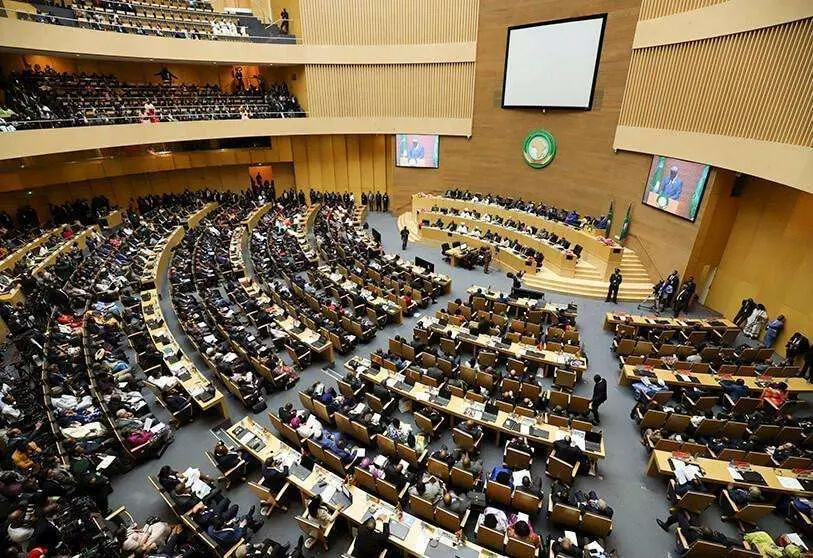The overshadowed EU-AU summit

In the flurry of news about Ukraine and the successive negotiations between Lavrov and Blinken, just six days before its invasion, one event went unnoticed. At that time, 17-18 February, the sixth EU-African Union (EU-AU) summit was taking place, and no one remembers it any more.
The summit aimed to relaunch a new Euro-African partnership based on the priorities of prosperity, security and mobility. However, the eclipsed summit concealed issues such as the AU's political-financial difficulties, the presence of the Polisario in the EU and Sánchez's meeting, against all odds, with the mercenary Ghali.
The Organisation of African Unity (OAU, 1963-2002) had as its objectives the liberation of the continent from all colonial vestiges, the promotion of unity, solidarity and the safeguarding of the sovereignty of its member states, among others. However, in its nearly 40 years of existence, it is only remembered for its corruption and mismanagement. Weaknesses that prevented it from fulfilling its functions, such as halting the continuous military uprisings and bloody ethnic strife that occurred under its mandate (Rwanda War). In this sense, the African organisation had achieved the worst of its record and, at the time, was labelled a "dictators' club".
The incorporation of the phantasmagorical Polisario republic, Rasd, into the OAU in 1982 took place in a context marked by the perversion that governed the institution. A rotten conjuncture where Algeria would find its natural habitat, and gas money, to corrupt wills. The vote was by simple majority. Twenty-six countries out of 50 voted in favour of Polisario's entry into the OAU, in violation of Article 4 of the organisation's charter, which stipulated that "only independent and sovereign countries" were entitled to it, and Article 28, with a reinforced quorum of 2/3, which previously settled the interpretation of the requirements of "independence" and "sovereignty", necessary for any accession procedure.
It was a vote as illegal as its accession, where the concepts of "independence", "sovereignty", "admission" and "recognition" had been violated and confused. Algeria had financed the whole process and bought all the will within its reach so that the Polisario could acquire, deceitfully, an entity in the form of an "independent and sovereign" republic using the OAU as a means. When the OAU was entered as an independent and sovereign country, and not the other way around. Key attributes that Polisario did not have then, nor now, nor in the future.
The advent of the new AU, created in 2002 in Durban (South Africa), seemed to be the turning point in the democratic evolution of the peoples of Africa. However, like its predecessor, the AU is not making fundamental progress. Many of its member countries still lack monetary autonomy, as they are still tied to the CFA franc (African Financial Community) controlled by the Banque de France. It is also mired in deep political and financial difficulties of the highest order. Thus, the AU remains incapable of preventing or resolving regional conflicts or maintaining peace and stability (Libya, Somalia, Sudan, etc.), or of containing coups d'état and violations of fundamental freedoms. Nor is it capable of dealing with the terrorism affecting the Sahel, nor of preventing famine and the shipwreck of young people crossing the Mediterranean to Europe or crossing the Atlantic corridor to reach the Canary Islands.
This is compounded by persistent poor governance and corruption undermining its organs. Member states are unable to pay their annual dues due to heavy indebtedness. A large part of their operating budget (75%) is financed by the major powers. As a result, its independence and its capacity to act are both limited and suspect. It is in this context that the AU maintains within its ranks an anecdotal republic, the Rasd, which uses child soldiers in its ranks and even at the reception of the UN special envoy, Staffan de Mistura, who was flanked by a child in military dress, arousing the indignation and rejection of international observers, politicians and journalists.
And it is also this AU that has just held its sixth summit with the EU, with the presence of the mercenary Ghali, who has suffered isolation amid protests from European leaders. He is not recognised by any European state and most African countries now consider him illegitimate because he has no national attributes. In this sense, the EU is co-responsible for allowing the armed separatist leader into its institution on the basis of an EU-AU bilateral agenda that focused on security, governance, agriculture, vaccine production, education and vocational training. Subjects in which the Polisario would neither participate nor contribute to the round tables. And the fact that it was invited by the AU and not the EU (as argued by European officials) was a mockery of intelligence and sets a serious precedent.
Nevertheless, Pedro Sánchez would give an unexpected usefulness to the fruitless presence of Polisario Ghali by informing him, in person, of Spain's decision to adhere to the internationally accepted thesis of autonomy under the sovereignty of the Kingdom of Morocco. This decision had been taken a few days earlier, following a meeting in Madrid between Blinken's "number two", Wendy Sherman, and Minister Albares.
It should be noted that the days of the presence of the virtual republic of the Rasd in the AU are numbered, since this entity is not a state, the Polisario is nothing more than a group of mercenaries in the pay of Algeria, therefore, it does not represent the Saharawis and Ghali is a refugee with an Algerian passport.

